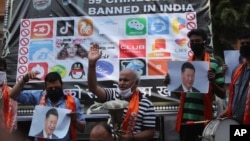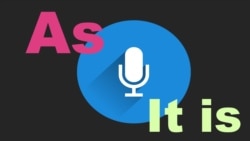The hugely popular Chinese app TikTok may be forced out of the United States. Wednesday, President Joe Biden signed into law a conditional ban of the video-sharing app.
India banned TikTok almost four years ago. Here is a look at what happened there.
Why did India ban TikTok?
In June 2020, TikTok users in India said goodbye to the app, operated by Chinese internet company ByteDance. India banned the popular app suddenly, following a deadly military clash with India along their shared border. India banned many other Chinese apps at the same time. Ties between the two Asian countries hit a new low.
The Indian government said it ordered the ban for security reasons and privacy protection. The Indian public mostly supported the ban.
The message from the government was, “how can we allow Chinese companies to do business in India when we’re in the middle of a military standoff,” said Nikhil Pahwa. He is a digital policy expert and founder of technology news website MediaNama.
Just months before the ban, India restricted investment by Chinese companies, Pahwa added. “Today, India has banned over 500 Chinese apps to date,” he said.
How did users and creators react?
At the time, India had about 200 million TikTok users, the most outside of China. The company also employed thousands of Indians.
TikTok users and content creators, however, needed a place to go. Within months, Google created YouTube Shorts and Instagram created its Reels feature. Both were similar to the short-form video creation that TikTok is known for.
Pahwa said those companies captured “most of the market that TikTok had vacated.”
Winnie Sangma misses posting videos on TikTok and earning a bit of money. But after the ban, he moved to Instagram and now has 15,000 followers.
“I have built up followers on Instagram too, and I am making money from it, but the experience isn’t like how it used to be on TikTok,” he said.
How India’s ban is different from the U.S.
The U.S. measure gives ByteDance, the app’s parent company, nine months to sell it. If this does not happen, TikTok will be banned. It would take at least a year before the ban goes into effect. However, the measure is expected to face legal battles that could delay the process.
In India, the process was quick. TikTok and other companies were given time to answer questions on privacy and security. But, by January 2021, a permanent ban was in place.
The situation in the U.S. is different, said Pahwa. “In India, TikTok decided not to go to court, but the U.S. is a bigger revenue market for them.”
Pahwa added that with American free speech protections “it’s not going to be as easy for the U.S. to do this as it was for India.”
As Chinese apps spread across the world, Pahwa says countries should reduce their dependence on Chinese companies. He said Chinese apps can create a national security risk.
Afghanistan, Nepal and Pakistan also banned TikTok. Many countries in Europe restrict the app as well.
“Chinese intelligence law and its cybersecurity law can allow Chinese apps to work in the interest of their own security. That creates a situation of distrust and it becomes a national security risk for others,” said Pahwa.
“There should be different rules for democratic countries and for authoritarian regimes where companies can act as an extension of the state,” he added.
I’m Dan Novak.
Dan Novak adapted this story for VOA Learning English based on reporting from The Associated Press.
_______________________________________________
Words in This Story
allow — v. to permit
digital — adj. using or characterized by computer technology
vacate — v. to leave
revenue — n. money that is made by or paid to a business or an organization
authoritarian — adj. expecting or requiring people to obey rules or laws
regime — n. a form of government










Forum